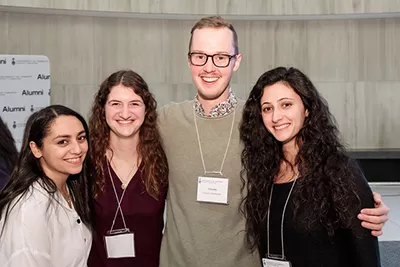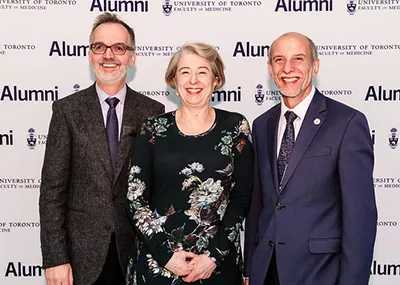
Celebrating the introduction of OT training at UTM
The recent launch of occupational therapy training at the University of Toronto Mississauga was celebrated Nov. 20 at a campus reception that also marked the centennial anniversary of the profession.
This past fall, U of T’s Master of Science in Occupational Therapy (MScOT) program, which has traditionally been offered only at the St. George Campus, was expanded to UTM to meet intense demand for the program. Last year, the program attracted 953 applications for its 90 available spots. With the MScOT program now offered through UTM’s Mississauga Academy of Medicine (MAM), 40 new spots have been created. The expansion will help better meet public demand for OTs in Ontario.
In the rotunda of the Innovation Complex, administrators, professors and the inaugural class of students gathered to mark the milestone, reflect on the growth and successes of MAM and UTM, and celebrate the university’s ability to better serve the local community.
“This is a growing, thriving region that is crying out for more health professionals, so this is the beginning of a wonderful future for the whole rehabilitation sector in Mississauga,” said Dr. Trevor Young, Dean, Faculty of Medicine.

The event also marked the 100th anniversary of the OT profession in Canada. Susan Rappolt, chair of the department of Department of Occupational Science and Occupational Therapy and the lead organizer behind the MScOT expansion, shared OT’s origins and evolution in the country.
“Occupational therapy education and practice started in rapidly expanding communities where wounded veterans were returning to their homes and jobs, and where many immigrants were adjusting to new ways of life,” Rappolt says. “In more recent history, under the leadership of two former U of T chairs, the department and the MScOT program have renewed their focus on health and wellness in communities.”
The hour-long event included comments by Faculty of Medicine leaders Dr. Alison Freeland, Associate Dean, Medical Education (Regional) and Dr. Allan Kaplan, Vice-Dean, Graduate and Academic Affairs, followed by a duo of student musicians playing classical music on violin and cello.
A highlight was a keynote talk on student mental health by Bonnie Kirsh, a professor in the Department of Occupational Science and Occupational Therapy. Kirsh helped launch the Mental Health Commission of Canada’s National Standard for Psychological Safety in the Workplace. She has also helped lead initiatives to reduce stigma related to mental illness, and to help homeless people in Canada experiencing mental health problems.
In her presentation, Kirsh outlined the significant rise in mental health issues among today’s post-secondary students due to a mix of factors: high academic expectations, weak social networks, a lack of support from professors and staff, and the expectation to cope independently. What’s more, many students don’t seek help for these issues because they’re concerned with being stigmatized. Research shows students today experience relatively high levels of hopelessness, loneliness, anxiety and sadness.
To address this situation, Kirsh is co-leading a study with funding from the Canadian Institutes of Health Research and the Rossy Family Foundation that involves using OT to enhance student mental health. They are providing U of T undergraduate students experiencing mental health concerns with access to 12 weeks support through an OT lens that emphasizes promoting meaningful activities, building cognitive strategies and developing problem-solving skills.
“We are looking at helping students fulfil their student roles, and not just restricting it to academic activities, but their social, productive and family roles as well,” Kirsh said. “We think we’re going to enable students to achieve success, and meet a growing need on campus, not just for students with diagnosed mental illness, but for students who may be at risk.”
